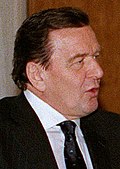
Back الانتخابات الفيدرالية الألمانية 1998 Arabic Парламенцкія выбары ў Германіі (1998) Byelorussian Eleccions federals alemanyes de 1998 Catalan Německé volby do spolkového sněmu 1998 Czech Forbundsdagsvalget 1998 Danish Bundestagswahl 1998 German Elecciones federales de Alemania de 1998 Spanish 1998. aasta Saksamaa parlamendivalimised Estonian Saksan liittopäivävaalit 1998 Finnish Élections fédérales allemandes de 1998 French
| |||||||||||||||||||||||||||||||||||||||||||||||||||||||||||||||||||||||||||
All 669 seats in the Bundestag 335 seats needed for a majority | |||||||||||||||||||||||||||||||||||||||||||||||||||||||||||||||||||||||||||
|---|---|---|---|---|---|---|---|---|---|---|---|---|---|---|---|---|---|---|---|---|---|---|---|---|---|---|---|---|---|---|---|---|---|---|---|---|---|---|---|---|---|---|---|---|---|---|---|---|---|---|---|---|---|---|---|---|---|---|---|---|---|---|---|---|---|---|---|---|---|---|---|---|---|---|---|
| Registered | 60,762,751 | ||||||||||||||||||||||||||||||||||||||||||||||||||||||||||||||||||||||||||
| Turnout | 49,947,087 (82.2%) | ||||||||||||||||||||||||||||||||||||||||||||||||||||||||||||||||||||||||||
| |||||||||||||||||||||||||||||||||||||||||||||||||||||||||||||||||||||||||||
 The left side shows constituency winners of the election by their party colours. The right side shows party list winners of the election for the additional members by their party colours. | |||||||||||||||||||||||||||||||||||||||||||||||||||||||||||||||||||||||||||
| |||||||||||||||||||||||||||||||||||||||||||||||||||||||||||||||||||||||||||
| This article is part of a series on the |
| Politics of Germany |
|---|
 |
Federal elections were held in Germany on 27 September 1998 to elect the members of the 14th Bundestag. The Social Democratic Party (SPD) emerged as the largest faction in parliament for the first time since 1972, with its leader Gerhard Schröder becoming chancellor. The Christian Democrats had their worst election result since 1949.[1]
- ^ James, Peter (2000). "The 1998 German Federal Election". Politics. 20 (1): 33–38. doi:10.1111/1467-9256.00108. ISSN 0263-3957. S2CID 143788580.




